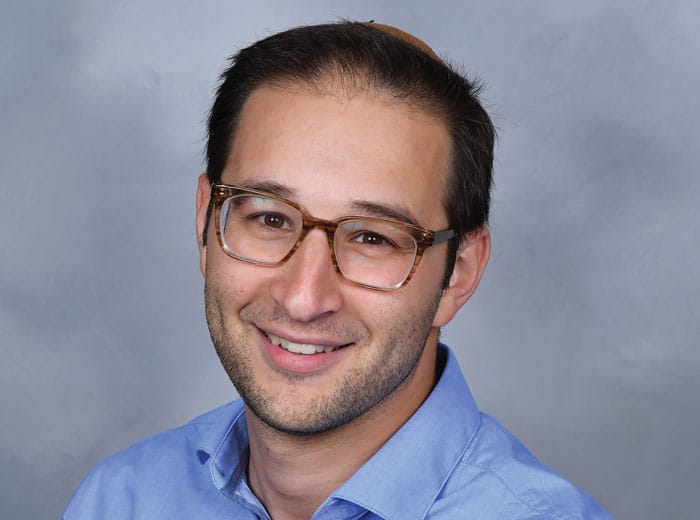 Rabbi Ari Schwarzberg
Rabbi Ari Schwarzberg It seemed destined that one day, Rabbi Ari Schwarzberg would work in the Jewish community. Growing up in Highland Park, New Jersey, he was the son of Rabbi Ronald Schwarzberg, the director of Jewish Career Development and Placement at Yeshiva University, and Judith Schwarzberg, a preschool teacher at Rabbi Pesach Raymon Yeshiva. His grandfather was one of the founders of the Jewish community and day school in Atlanta, Georgia.
“Jewish professional work was in my blood,” said Schwarzberg, who is dean of students at Shalhevet High School and director of The Shalhevet Institute. “It was talked about in the home all the time and at every Shabbos meal. I learned about it at a very young age.”
The rabbi got smicha (ordination) at Yeshiva University and also attended Harvard Divinity School, where he graduated with a master’s in Theological Studies.
“There, I learned from colleagues who were devoutly Christian and Muslim, and it gave me a much wider and broader perspective on the history and value of Judaism,” he said.
For 10 years, Schwarzberg has been working at Shalhevet; he started as a full-time teacher there, and still teaches classes when he isn’t doing administrative work.
“One of the things I do in the school is deal with disciplinary issues, which is a lot of fun,” he said. “I actually like doing it.”
Schwarzberg sees that aspect of his job as a chance to help students become who they are meant to be.
“Most educators go into this line of work because they’re really invested in growth,” he said. “It’s really an opportunity to help students understand the value of respect and hard work and doing the right thing, even when you don’t want to do it.”
According to Schwarzberg, the school doesn’t punish students much. Instead, the educators engage in conversation with students and parents and help the students find their true selves.
“The students realize that they didn’t want to make a mistake,” he said. “They really want to do the right thing. Sometimes, it takes the right support and authority to help students get to where they want to be.”
In a time when polls and surveys report how younger Jews are disconnected from their Judaism, Schwarzberg doesn’t see that at Shalhevet. The main challenge in engaging with the younger generation, he believes, is that there are so many other things out there vying for their attention.
“Students are much more informed about things going on in the world than we were. They have more knowledge and are able to ask much more complex questions than I could when I was their age.”
“There is a greater magnet towards distractions, and we didn’t have that 20 years ago,” he said. “Students are much more informed about things going on in the world than we were. They have more knowledge and are able to ask much more complex questions than I could when I was their age.”
While education is about innovation, Schwarzberg said that the way Shalhevet keeps teens connected to their Judaism is simple: through learning Torah.
“Opening up the Gemara or Tanach is incredible,” he said. “When you learn it with good teachers in a comfortable classroom setting, to me, that is still undefeated. We should never veer away from that. That classical model is great.”
When looking at the overall lesson he wants to impart on his students, he turns to a teaching from Naftali Tzvi Yehudah Berlin, a rabbi in the 19th century also known as the Netziv.
The Netziv teaches that in the desert and at Har Sinai, things were done in a supernatural way, and there were a lot of miracles. God’s relationship with the Jewish people was miraculous.
“The goal was not to be encompassed by supernatural miracles, though,” said Schwarzberg. “The goal is to do it on your own. To look at the world and see God and godliness in even the most mundane things.”
He continued, “That’s a message I want to cultivate in all of my students. Don’t have someone do something for you. Instead, perceive the world in such a way where you can find God in all the different things around you.”
Fast Takes with Ari Schwarzberg
Jewish Journal: What is your favorite Jewish food?
Ari Schwarzberg: Holy Grill on Pico. They have great shawarma, just like in Israel.
JJ: What extracurriculars did you participate in when you were in high school?
AS: I played on the basketball team, but I wasn’t that good. I was involved in the Torah Bowl competition, too.
JJ: What do you do on your day off?
AS: If I can get in a round of golf, that’s my dream.
JJ: What’s your perfect Shabbat look like?
AS: A Shabbaton where you go away from your regular life with a group of people and daven, learn and eat together. As an educator, I have those a few times a year. They give you a glimpse of the best version of yourself. When you get that glimpse, it’s transformative.






















 More news and opinions than at a Shabbat dinner, right in your inbox.
More news and opinions than at a Shabbat dinner, right in your inbox.